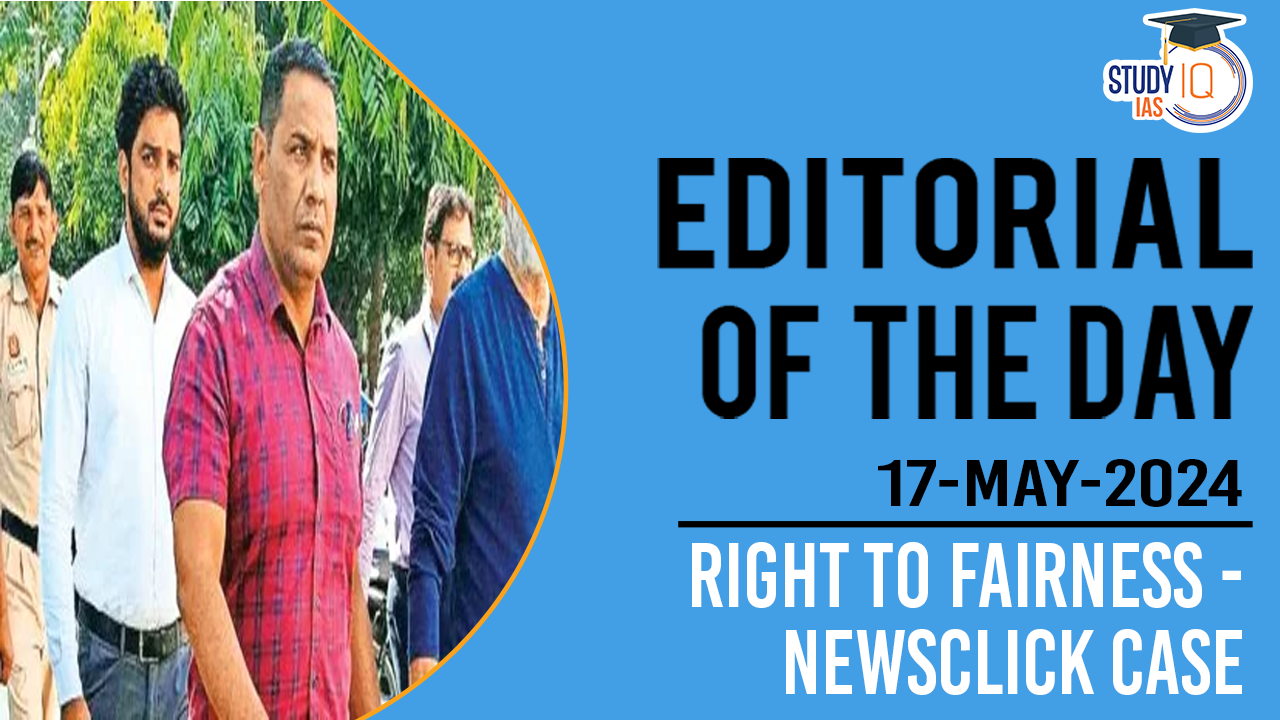Table of Contents
Context: The Supreme Court of India, in a recent judgement delivered in the case of Prabir Purkayastha, founder-editor of Newsclick, has reaffirmed the importance of due process of law as a fundamental right and a measure of a civilised society.
More in News
- The court highlighted the distinction between “reasons of arrest” (formal and common to all arrests) and “grounds of arrest” (specific to the individual).
- Failure to communicate the grounds of arrest in writing violates the right to life and personal liberty, making the arrest and detention illegal.
Historical Context of Due Process
- The concept of due process dates back to the Magna Carta (1215) and was first used in law by British King Edward III.
- The Fifth Amendment to the U.S. Constitution introduced due process, later expanded by the Fourteenth Amendment.
- Due process ensures fairness, reasonableness, justness, and non-arbitrariness, striking down several laws and recognizing new rights in the U.S.
Due Process in India
- The Indian National Congress, in 1918, demanded the revocation of laws allowing arrest without due process.
- Despite initial interest in the Due Process Doctrine, the framers of the Indian Constitution abandoned it, opting for “procedure established by law”.
Constituent Assembly Deliberations
- On March 17, 1947, K.M. Munshi proposed a draft provision for due process in the Indian Constitution.
- N. Rau’s advice led to replacing “due process” with “procedure established by law” in Article 21, narrowing its scope.
- Several Assembly members were disappointed, fearing routine detentions without due process.
- In September 1949, B.R. Ambedkar introduced Article 22 to compensate for the omission of due process in Article 21.
- Article 22 incorporated rights already part of the colonial government’s Code of Criminal Procedure, 1898.
Judicial Interpretation Post-Independence
- The SC initially undermined due process in judgments like A.K. Gopalan (1950) and ADM Jabalpur (1976).
- In later cases, such as Maneka Gandhi (1978), due process was judicially recognized as part of the right to life and personal liberty.
- The 44th Amendment (1978) made the right to life and personal liberty non-derogable, even during emergencies.
Recent Developments
- In Pramod Singla (2023), the SC criticised preventive detention laws as a colonial legacy with potential for abuse.
- The court stressed the need to follow every procedural requirement rigidly.
- Despite this, India still has stringent preventive detention laws, with over 12,000 people in prison under such laws in 2021 and 76% of prison inmates under trial in 2022.
| Aspect | Due Process of Law | Procedure Established by Law |
| Origin | Rooted in the U.S. Constitution (Fifth and Fourteenth Amendments) | Rooted in the Indian Constitution (Article 21) |
| Scope | Broad and substantive | Narrow and procedural |
| Focus | Ensures fairness, reasonableness, and justness in law | Ensures that the law is followed as per legislative procedures |
| Protection Against | Arbitrary actions by the state; includes both substantive and procedural safeguards | Only procedural actions; does not necessarily protect against arbitrary laws |
| Impact on Legislation | Can lead to the invalidation of laws that are unjust, unfair, or unreasonable | Only checks if the law has been followed correctly; does not assess the law’s fairness |
| Example of Application | U.S. courts striking down laws that violate fundamental rights (e.g., privacy, liberty) | Indian courts ensuring that legal procedures are adhered to, even if the laws themselves are harsh |
| Historical Background | Evolved from the Magna Carta and further developed in the U.S. Constitution | Introduced in the Indian Constitution, influenced by British and Irish legal traditions |
| Key Court Case (India) | Maneka Gandhi v. Union of India (1978): Expanded Article 21 to include due process | A.K. Gopalan v. State of Madras (1950): Interpreted Article 21 narrowly, focusing on procedure |


 UDAN Scheme, Objectives, Funding and Ach...
UDAN Scheme, Objectives, Funding and Ach...
 Indus Water Treaty 1960 Suspended by Ind...
Indus Water Treaty 1960 Suspended by Ind...
 5 Years of SVAMITVA Scheme and Its Benef...
5 Years of SVAMITVA Scheme and Its Benef...





















